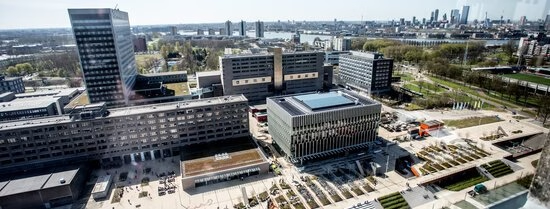Six young researchers from Erasmus University Rotterdam (EUR) and Erasmus MC have been awarded a Veni grant by the Dutch Organisation for Scientific Research (NWO). This funding will enable the researchers to further develop their scientific research.
The Rotterdam laureates
How can female leaders effectively manage employee voice? - dr. Sofya Isaakyan, Rotterdam School of Management
“Despite increasing discussions about social equality and societal efforts to introduce it in organisations, female leaders still face gender-related biased evaluations. These evaluations may be triggered when female leaders endorse or reject their employees’ change-oriented ideas, consequently leading to negative implications for themselves. This project seeks to understand these implications and provides timely solutions enabling female leaders to effectively manage their employees’ change-oriented ideas and overcome biased evaluations.”
Valuing the body: a moral history of human tissues in twentieth-century medicine – Dr. Noortje Jacobs, Erasmus MC
“From organs, blood and bones to urine, milk and sperm—in today's medicine we can donate almost every part of our body. The possibilities seem limitless; but we do set moral limits. What are those limits exactly? Why do we put them where we put them? And how do these boundaries unfold in the daily practice of medicine? In this project, I investigate moralization processes surrounding the use of human tissues in twentieth-century Dutch medical practice. With this historical perspective, I examine how modern medicine has affected how we morally value (parts of) our body.”

Caring for Resilience: A Multi-Sited Ethnography of Knowing, Valuing, and Managing Nature – dr. Irene van Oorschot, Erasmus School of Social and Behavioural Sciences
“‘Resilience’ is the new buzzword in environmental policy, the thought being that our ecosystems have to become ‘resilient’ against the challenges accompanying rapid and unpredictable climate change. But what does that entail in practice? What value judgments come into play when environmental management professionals try to ‘foster resilience’, and what knowledges does it require? Drawing on in-depth ethnographic fieldwork in three ecosystem types – heath, forest, and tidal areas – I study how ‘resilience’ takes shape in the actual, everyday practices of environmental management professionals, and analyze how ‘resilience’ generates novel forms of knowing, valuing, and managing nature.”
No music, no life? How music shapes subjective wellbeing across social groups – Julian Schaap, Erasmus School of History, Culture and Communication
“While listening to music has proven benefits for subjective wellbeing, one person’s deeply soothing tune can fuel another person’s profound loathing. As tastes in music are shaped by people’s social backgrounds, this mixed-methods project investigates why music shapes subjective wellbeing differently across social groups based on class, gender and race/ethnicity.”
Optimizing Health Service Delivery Channels in Low- and Middle-Income Countries – dr. Harwin de Vries, Rotterdam School of Management
“To enhance access to health services, stakeholders are investing in four service delivery channels: static clinics, mobile outreach, door-to-door outreach, and virtual outreach. Which channels to select for a given service and context remains an open question. This project develops models, algorithms, insights, and simple decision rules for decision makers.”

Pattern recognition in extreme events – dr. Phyllis Wan, Erasmus School of Economics
Extreme events, such as the 2008 financial crisis and the 2021 European flooding, entail high risks for the society. Quantifying the risks of extreme scenarios is the first step towards preventing catastrophic outcomes. As extreme observations are scarce by nature, this task is mathematically challenging and rely on the efficient detection of patterns in data. This research proposes new perspectives for pattern recognition in extreme observations by adapting machine learning techniques.
About Veni
Together with Vidi and Vici, Veni forms part of the NWO Talent Programme (previously: De Vernieuwsingsimpuls (the Innovational Research Incentive Scheme)). Veni is aimed at researchers who have recently gained their doctorates. Within the Talent Programme researchers are free to submit their own subject for funding. In this way NWO encourages curiosity-driven and innovative research. NWO selects researchers on the basis of the quality of the researcher, the innovative character of the research, the expected scientific impact of the research proposal and possibilities for knowledge utilisation.
- Assistant professor
- Associate professor
- Assistant professor
- Assistant professor
- Assistant professor
- Related content

